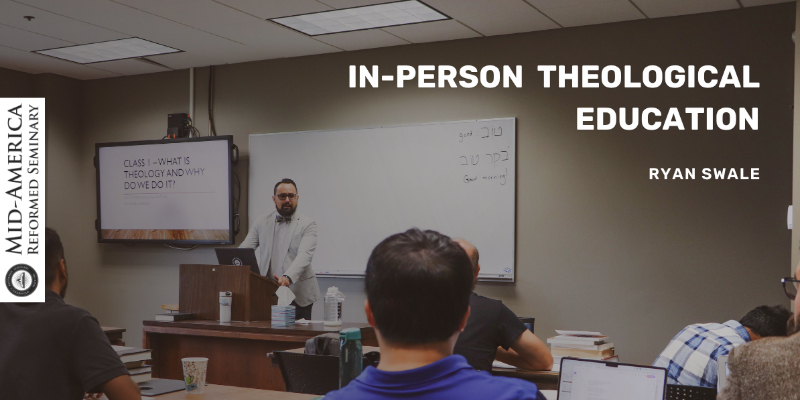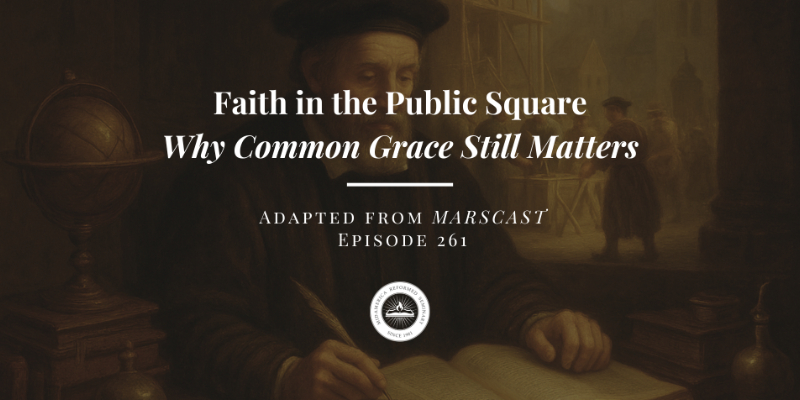
Grounded in Grace: Finding Assurance in God's Word
This article has been adapted from MARSCAST Episode 262 featuring Dr. Cornelis Venema.
There is perhaps no question more pressing for the average believer than this: Can I be sure?
It’s a question whispered in hospital rooms and sleepless nights, in moments of failure and seasons of silence. Can I really be sure that I belong to Christ? That my sins are forgiven? That I will not be cast away? For many, the doctrine of assurance feels more like wishful thinking than a spiritual reality. They imagine assurance to be a kind of psychological bonus—a fragile, elusive state of mind granted only to the spiritually elite.
And yet, nothing could be further from the testimony of Scripture. The gospel does not merely offer salvation—it offers the knowledge of salvation. The message of Christ crucified and raised is not meant to leave the believer in a state of uncertainty, but to ground them in joyful confidence. The assurance of faith is not an accidental byproduct of spiritual maturity; it is part and parcel of what it means to rest in Christ alone.
Our challenge today is not that the promise has weakened, but that our perception of it has become clouded. We have, perhaps unintentionally, reduced assurance to a feeling—when in reality, it is a truth. And like all truths grounded in God’s covenantal faithfulness, it does not shift with the wind. The question, then, is not whether assurance is possible, but whether we are looking for it in the right place.
The Great Anchor: God's Promises Across Scripture
To speak about assurance, we must begin not with the internal life of the believer, but with the external, objective Word of God. This may seem counterintuitive in an age that prizes experience and emotion as the most authentic markers of truth, but the Reformed tradition—and more importantly, Scripture itself—bids us look elsewhere: to the unchanging character of God and His covenantal promises.
From the earliest pages of Scripture, the people of God are presented not as those who earn their standing before Him, but as those who receive it. Abraham, the father of faith, believed God, and it was credited to him as righteousness (Gen. 15:6). The promise came first. His response was one of trust. And on that basis, the Scriptures declare him justified.
The Psalms, rich in personal reflection, do not hide the struggles of the soul. And yet, again and again, we find the Psalmists anchoring their confidence not in their inner strength, but in God’s steadfast love. Psalm 32 opens with a jubilant declaration: “Blessed is the one whose transgression is forgiven, whose sin is covered.” This is the voice of a man who knows—by God’s own Word—that he has been pardoned. In Psalm 103, David assures us that the Lord “does not deal with us according to our sins…as far as the east is from the west, so far does He remove our transgressions from us.” Such language cannot be mistaken for ambiguity. It is the language of certainty rooted in God’s covenant mercy.
The New Testament intensifies this theme. Paul, in Ephesians 1 and 2, details the gospel’s benefits with remarkable clarity: redemption, forgiveness, adoption, the sealing of the Spirit. And all of these are “according to the riches of His grace.” In chapter 2, Paul reminds us that we are saved by grace through faith, and that not of ourselves; it is the gift of God. The emphasis could not be more emphatic: salvation is of the Lord, and so is the assurance that accompanies it.
Romans 8 and the Witness of the Spirit: Not Apart from the Word
Among the most comforting and doctrinally rich chapters in all of Scripture is Romans 8. There, Paul declares that “There is therefore now no condemnation for those who are in Christ Jesus.” But Paul does not stop at justification. He moves seamlessly into adoption, and there introduces a vital dimension of assurance: the internal witness of the Spirit.
The Spirit Himself bears witness with our spirit that we are children of God (Rom. 8:16).
What are we to make of this “witness”? Is it a mystical feeling? An emotional surge? A whisper detached from the Word?
The Reformed tradition gives us a far more grounded answer. The Holy Spirit does not testify apart from the Word of God. Rather, He presses the Word into the soul of the believer. The Heidelberg Catechism puts it this way: “The Holy Spirit assures me of eternal life through the gospel.” That is, the same Spirit who inspired the Word now applies it inwardly. It is the Spirit’s affirmation that the gospel is not merely true in the abstract, but true for me.
Theologians sometimes debate whether Romans 8:16 refers to a “joint witness” (with our spirit) or an “internal witness” (to our spirit). However we parse the grammar, the result is the same: the believer is granted a deep and real awareness of sonship, not by looking inward, but by hearing afresh the Word of God, through the Spirit, declaring, You are mine.
This is why assurance, rightly understood, is deeply personal yet never private. It is not divorced from Scripture. It is bound to it, clarified by it, and continually nourished through it. The Spirit does not shout over the Word; He echoes it in the depths of our hearts.
Faith Rests: The Paradoxical Posture of the Soul
There is a paradox at the heart of the gospel: faith is active, and yet its chief act is to rest. It does not perform; it receives. It does not earn; it trusts.
John Calvin compared faith to an empty vase—devoid of anything until the Word of God fills it. Thomas Manton called it “the cessation of working.” And Paul, in Romans 4, explains that Abraham’s faith was credited as righteousness precisely because it did not rely on works.
This is what makes faith the perfect instrument of grace. It refuses to look inward for grounds of confidence. It looks outward to Christ. As the older theologians put it, faith is extrospective. It draws life from another.
This is where assurance is ultimately found—not in the strength of our grip, but in the strength of the One who holds us. The question is not, “Is my faith strong enough?” but rather, “Is Christ sufficient?” And to that question, the gospel answers with resounding certainty: Yes.
Conclusion: The Promises Hold—Even When You Feel Like You Don’t
To the struggling believer: assurance is not beyond your reach. It is not reserved for a spiritual elite. It is yours—not because your faith is perfect, but because your Savior is. The promises of God are not like shifting sands. They are a rock. And when you build your house upon that rock—even amid the storms of doubt—it will not fall.
You may feel at times as though you are slipping. But remember: the promises of God do not depend on your feelings. They depend on Christ. He is faithful. He will never cast out those who come to Him.
So come again.
Come with trembling hands, with a faltering heart. Come with your doubts and fears. But come. And find rest—not in yourself, but in the sure and certain promise:
Whoever believes in Him shall not perish, but have eternal life.
That promise is enough.
That promise is yours.
Recent articles




